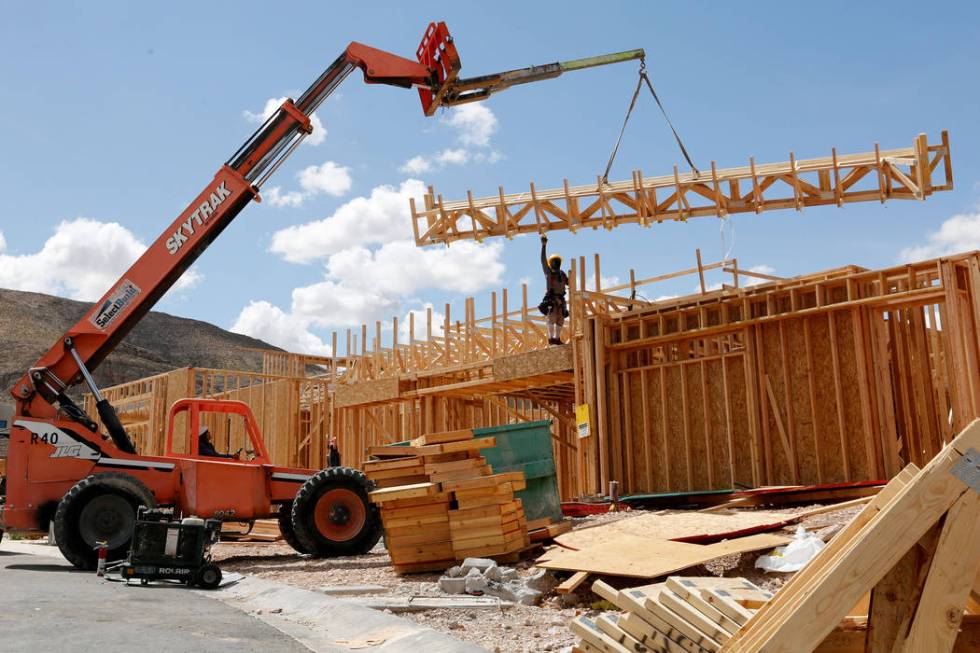Foes of construction defect bill say affordable housing will shrink

Four years after Republican lawmakers raised barriers to pursuing lawsuits alleging shoddy construction, Nevada real estate firms are trying to stop Democrats from rolling that law back.
The state Assembly approved a bill last month that would make it easier for homeowners to pursue construction defect claims — and potential lawsuits — against builders, contractors and others who worked on their houses. The Senate Judiciary Committee passed it May 17.
With Democrats controlling both chambers of the Legislature and the governor’s office, the bill would wipe out or change provisions of a law passed in 2015 — when Republicans ran Carson City — that cracked down on construction defect litigation.
It also comes at a time when homebuyers who want new construction are gravitating toward lower-priced condos and townhouses, the kinds of projects that will be affected most by the bill, according to a lobbyist for homebuilders.
As approved by the Assembly, the measure would, among other things, restore the definition of a constructional defect to include “in violation of local codes or ordinances,” which was stripped out in 2015, and let homeowners pursue claims up to eight years after the work was completed, up from six years under the previous law.
The proposal, Assembly Bill 421, is backed by attorneys and opposed by homebuilders, contractors and firms that generate business from Nevada’s real estate industry, including insurers and even a home-cleaning company, as seen in letters to lawmakers.
Supporters say the measure is needed to give homeowners more power to file claims for construction problems. The Nevada Justice Association, a lobbying group for lawyers, said the 2015 bill changed state law “dramatically to the benefit of builders” and that the new measure would “restore the balance” for homeowners.
Ardea Canepa-Rotoli, a board member at the association, told the Review-Journal that construction defect litigation is “significantly down” in Nevada, but “it’s not because magically there’s no more defects.”
Canepa-Rotoli, a partner at Reno law firm Maddox, Segerblom &Canepa, said the previous law “went way too far” and “restrained” homeowners’ rights.
In a letter to lawmakers, Gabriella Fogliani-Bertolino, of Reno, said she and her family moved to their house in 2008 and noticed problems years later. Drywall and stucco were cracking, hardwood floors were separating, and the backyard concrete patio “actually started to pull away from the house.”
She realized a bigger problem must be going on after talking to neighbors, but that was in late 2016, she wrote, and under state law, it was too late to pursue a claim.
Fogliani-Bertolino couldn’t get a loan from her bank to make the repairs, but even if she did, the extra payments “would create an extreme financial hardship for us.”
“What are we supposed to do? We can’t repair the home and under Nevada law, we have no recourse against the builder,” she wrote.
Opponents say construction defect lawsuits were far more common in Nevada than in other states, and that many cases were frivolous and initiated by lawyers.
They also say that if the new proposal becomes law, it could cause steep problems. The Nevada Home Builders Association said in a letter that the proposal would “undo the common-sense reforms” of 2015, lead to “long and costly lawsuits for homeowners” and shrink the “desperately needed market for affordable” condos and townhomes.
Lobbyist Nat Hodgson, chief executive of the Southern Nevada Home Builders Association, told the Review-Journal that developers’ insurance costs will climb if the bill is approved, and smaller builders may not be able to get any coverage for condo and townhouse projects.
“Probably all” attached-home projects in the Las Vegas Valley were hit with construction defect lawsuits in the early- to mid-2000s, he said.
“I don’t really want to focus on making it easier to sue,” Hodgson said.
Contact Eli Segall at esegall@reviewjournal.com or 702-383-0342. Follow @eli_segall on Twitter.